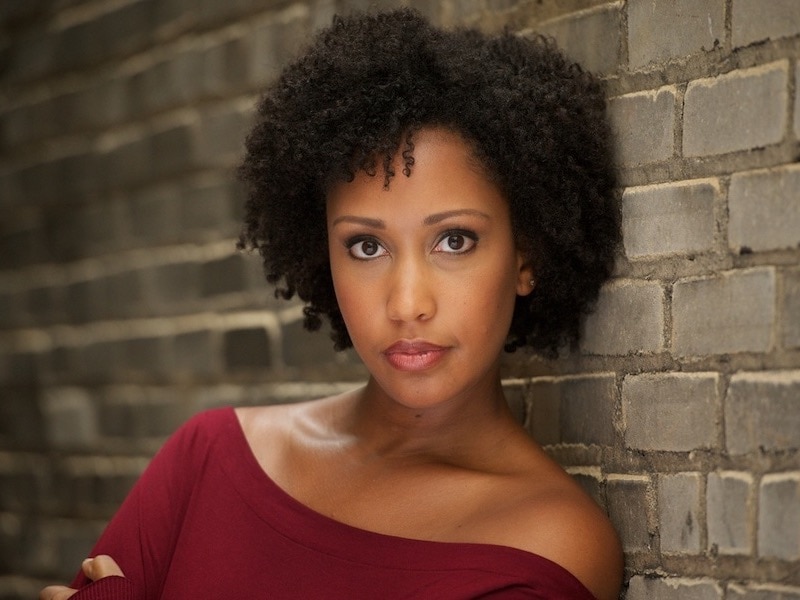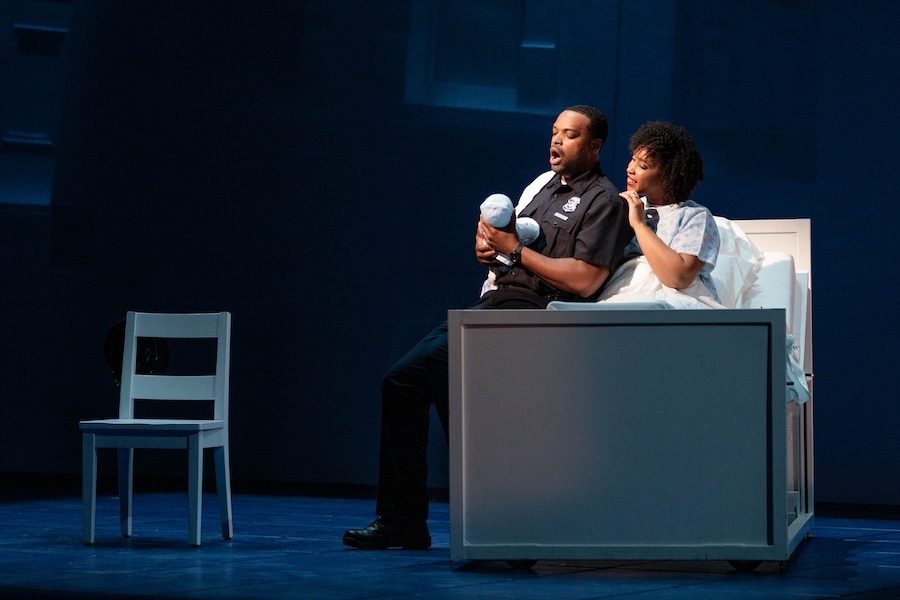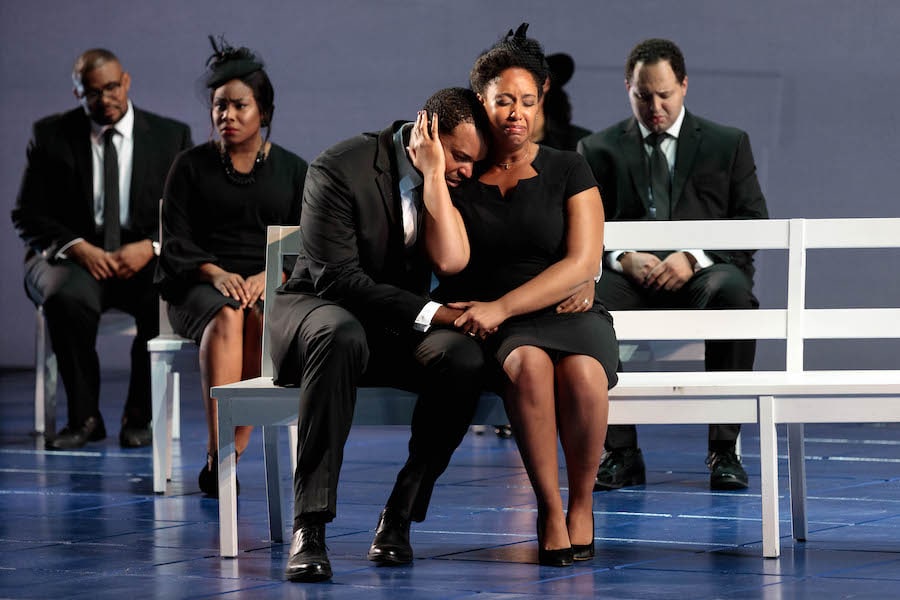I have been following the opera Blue since it was first announced by Washington National Opera to be part of the 2020–2021 season and heard Kenneth Kellogg sing an aria from the work by Jeanine Tesori and Tazewell Thomson. I traveled to Cooperstown, New York, to catch a performance when the show premiered at Glimmerglass Festival in summer of 2019. The opera was at the top of my most highly anticipated events list for spring of 2021. On the morning of March 14, before the last dress rehearsal I was planning to attend before its WNO Kennedy Center opening, I received an email. The show was canceled due to COVID-19.
I have been thinking about what the opera meant then and now and realized that while Kenneth Kellogg is the name and face associated with the opera’s story — a Black man and a cop working in Harlem ultimately loses his son who is killed by a fellow cop — I was missing the mother’s point of view. I had the opportunity recently to talk to the singer who plays the part, Briana Hunter.

Briana, you’ve lived with the role of The Mother since the beginning, just as Kenneth has, and the role was written for you by the team Tesori and Thompson. What has that been like for you through the opera’s interrupted birth?
Briana Hunter: (groaning) Oh, and there are such ripple effects for all of us coming back! There was this immense feeling as we came back, reliving that moment when it was announced we would be shut down — a moment we thought was going to last two weeks. We hadn’t even said goodbye to each other. To get so close! So, coming back was triggering a little bit. But we’re so glad to be able to return to Blue with so much of the original family and finally present it to DC, a city that with everything that has gone on is so ready for it.
And don’t recent national events make the opera feel more urgent, anguishing, and in the public consciousness than when the opera was conceived?
Yes, absolutely…sadly. But maybe people are more ready to look at and grapple with this issue.
Do the ongoing cycles of violence by cops, violent and deadly treatment of Black young men, not to mention ongoing worries about the next variant of the virus, make it harder to come back? As an artist, are you looking over your shoulder and indulging in rituals not to get jinxed again?
Yes, I won’t lie. There’s a part of you that keeps thinking that the opportunity to tell this important story could all go away, because it did. But we’re determined, we’re doing this. Back then, it was thrilling to see our names on buses and be involved with events engaging with the community. I so hope some of those people we met will come back to see it and sit with this piece.

I have wanted to learn more about your character. How does The Mother feel, and what is the woman’s journey?
Oh, man, Susan, you know we as performers are generally performing someone else’s work. Because I am a woman and a Black woman, I would have written something different. Maybe part of the reason for Kenneth being the face is that the libretto is written by a man. The Father and Son have an incredible scene. The Mother does not get a scene with the Son (Aaron Crouch) until the very end. I don’t mean to say Tazewell glossed over her, but you don’t get a lot about her relationships. Especially coming back to the work, there is such a rich inner life for me which may not be seen by the audience.
Say something more about that. Did you ever talk to the writer? Was there time in the process for full collaboration?
[Composer] Jeanine and I talked about character background stuff the way you do. I remember the epilogue hadn’t even been written yet, but Jeanine and Taz wanted to give her more. And Aaron felt too, “where is the scene between The Mother and son?”
Please say more about how you collaborated on your character’s background with the composer.
Well, we both had the sense she was very educated — maybe she went to the University of Michigan. We thought her girlfriends were all very successful professionals. So part of the conflict set up from the start has to do with class. Her friends are taken aback: “So you married a blue-collar worker? You were on track to be Michelle Obama!”
My character is also put into the middle of the situation between the two men in her life. She has a very close relationship with the son. She loves his creativity, idealism, and activism. The boy is pushing for the Dream for Black people and for the country. One of my favorite things about the show is the generational conversation, honestly to see the head-butting in the Black community. The younger generation pushes so hard for change against what was traditional and respectable, while my generation feels a little stuck in between. The young generation is demanding more, and it’s scaring a lot of folks. You see this acted out between the father and the son, and The Mother is somewhere in the middle, for sure.
You know, I had this thought the other day, what if she encouraged her son to go to the protest. Maybe she is excited about what he stands for, and yes, fearful for him but proud of how he is engaging at the same time. Then, what level of guilt does she carry?
I’m also thinking about the backlash she gets about being married to a cop from the community, and not just from her girlfriends. Of course, she is proud of her husband, his courage, the commitment to defend, and his ability to provide, but at the same time, I wonder if they argue about traditional gender roles — things we’re all dealing with in this day and age.
What has changed in the playing?
There is a deeper connection to the text, a sense of confidence in being able to play. We all can be more in the moment. It’s the ability to communicate direct things
We’ve sweated blood for this work, and I remember Jeanine said, “There is a cost doing a show like this.” And I don’t think I understood what she meant until after the first run. It was hard to shake off, hard to go to that devastating, barren place. A place of grief but beyond grief, one of outrage. We all still hope these things won’t happen anymore.

How does Briana’s own journey resonate with The Mother’s?
I don’t want to downplay the complete joy and pride I feel in playing this role. I love this man, the feeling of being loved, being wanted, being cared for. I stand by the conscious choices this man makes, and these rich Black relationships are not something that we see projected often in our society.
I remember the powerful tenderness and universality of the hospital scene, Father tenderly holding his newborn son and you expressing the ultimate mother-love —
The opera is a masterpiece. But there is room for more. My hope is that Blue will inspire more stories showing the inner life of women.
How has working on Blue changed you?
It’s made me better. In all my work, even classical opera in Italian, I want to have the extra-authentic connection because of the relevance and power of this story in our lives. I long to generate this feeling in my marrow in all opera I do now that I have experienced this.
And don’t you think this opera serves our community in a special way?
Yes, it enables us to come together and grieve collectively. The congregation scene invites the whole audience to be part of the healing.
Running Time: Two hours and 15 minutes plus a 25-minute intermission.
The opera Blue plays March 11 to 25, 2023, in the Eisenhower Theater at the John F. Kennedy Center for the Performing Arts, 2700 F Street NW, Washington, DC. Tickets ($35–$199) are available at the box office, online, or by calling (202) 467-4600 or (800) 444-1324.
Cast and creative team credits for Blue are online here.
COVID Safety: Masks are optional in all Kennedy Center spaces for visitors and staff. If you prefer to wear a mask, you are welcome to do so. See Kennedy Center’s complete COVID Safety Plan here.
Blue
Music by Jeanine Tesori / Libretto by Tazewell Thompson
In English with Projected English Titles
New Production, Co-Produced with The Glimmerglass Festival and Lyric Opera of Chicago




